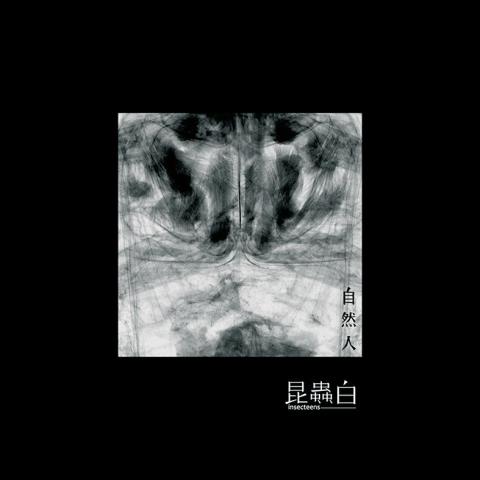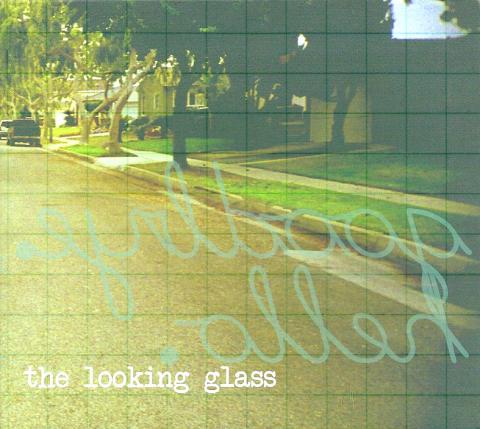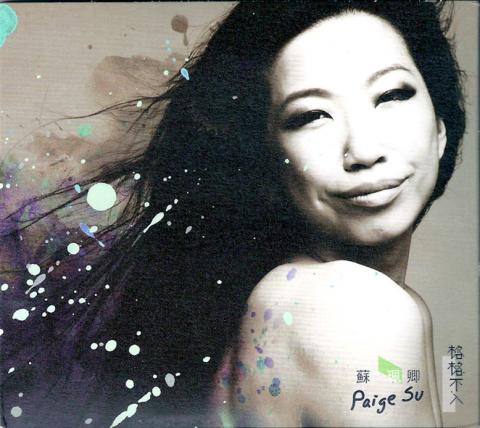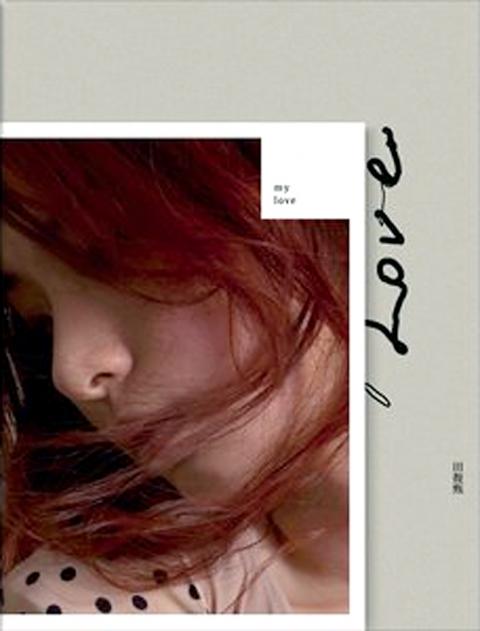This solo project by Insecteens (昆蟲白), aka Huang Jiang-shiun (黃建勳), the guitarist of and a driving force behind Sugar Plum Ferry (甜梅號), sheds a new light on one of Taiwan’s first homegrown post-rock bands.
The gray, rainy-day guitar tones that fill Huang’s solo debut Man of Nature (自然人) will ring familiar with Sugar Plum Ferry fans, but the relentlessly steady and slow-building soundscapes that characterize the band’s instrumental music aren’t to be found here.
This collection of tightly arranged indie rock and pop songs finds Huang playing the more straightforward singer-songwriter. He sends sparks flying from the start with Citizen Doolittle (小市民) and Zebra Crossing (斑馬線), both rousing, anthemic numbers teeming with jubilant guitar noise.

Beat Me (打敗我) begins with a quiet droning bass and clean electric guitar lines, and coupled with Huang’s soft, feminine crooning, nods to the post-punk and Brit-rock sound that has been an enduring influence on the Taiwanese indie scene.
Huang sings on most tracks, and it’s tempting to imagine that he hijacked Sugar Plum Ferry and yanked the group out of its shoe-gazing daze. But he does offer one instrumental that embraces post-rock, Landed on a Bench (降落在板凳上), which sits midway through the album, before launching back into indie-pop numbers like the scrappy Good Morning, Mr Q (早安!Q先生).
The album displays Huang’s talents as a multi-instrumentalist — he recorded and overdubbed all of the instruments except for the drums.

Huang doesn’t have the most memorable voice, but his delivery is honest and the songs sound inspired. Man’s themes revolve around the city and youthful nostalgia. Citizen Doolittle reads like a restless ode to the city: “He doesn’t want to leave/He doesn’t want to go back/He doesn’t want love” (不想離開,也不想回去,他不要愛情). The liner art is full of black-and-white photos of Huang in Taipei that date back to the late 1990s, and scenes of dilapidated living spaces prod the imagination on songs like Old Houses (老房子).
The title song, one of the best on the album, bristles with a volatile emotional energy that Sugar Plum Ferry seems to go out of its way to avoid. Perhaps Man is the outlet Huang had been waiting for.
— David Chen

The Looking Glass, a four-piece group from Taipei, is out to push all the right buttons when it comes to pop-punk. Goodbye Hello, released earlier this year, is an EP of four peppy tracks, with tempos constantly on the verge of overdrive and melodic hooks that clamor for attention.
It takes a few seconds to realize what’s going on in the title track, which begins with a faux doom-metal jam and breaks into an emo-fueled frenzy. “Every day is the same thing/We don’t want to waste our time with you,” guitarist and vocalist Jon Hom (譚家輝) sings in English in the refrain, with the proper amount of sneer. Lyrically, that line pretty much sums up the song’s sentiment: You suck, I’m outta here; get a load of these crashing cymbals and rip-roaring guitars.
MSN + Banana, two mini-songs in one, kicks off with a chord progression and melody that references Creedence Clearwater Revival’s Have You Ever Seen the Rain?, but before you know it, the song shifts into a power-pop chorus and then concludes with a minute-long, high-octane punk jam.

Hom’s foil is keyboardist and co-vocalist Annie Chii (杞亞軒), whose vintage-sounding, psychedelic synthesizer riffs add a touch of weirdness to the band’s straight-laced, sunshine emo sound. Chii sings her own verses with Hom on Write Back (回一封信), a power-pop number, but she sounds her best when harmonizing with Hom, whose vocal style favors pop precision. The final track, Bread (麵包), is an example of where their voices blend together well, as they sing the chorus line, “I hate you, you hate me” (我恨你,你恨我), with a snicker.
The group performs next Saturday at Underworld (地下社會) in Taipei.
— David Chen
Paige Su (蘇珮卿) is one to watch. In producing this beautiful sample of sophisticated jazz-pop, the singer-songwriter drew from extensive formal training: She graduated from the University of North Texas College of Music with a degree in flute and harp performance, and while there explored jazz and ethnic music. She now travels regularly to India as a devoted student of the Carnatic flute, a bamboo instrument used in South Indian classical music.
The EP’s title track, Upside Down (格格不入), begins with an alluring, fluid harp intro and breaks into an orchestration that’s one part jazz and one part rock a la Queen. But there’s no Freddy Mercury flamboyance here: Su comes across as having a gentle demeanor, with her silky rich voice treading delicately on top of the bombastic guitar-bass-drums arrangement. Her lyrics are simple but evocative; this song’s power comes from Su’s soft delivery, particularly when she sings the line “screaming and crying for help” repeatedly.
Su proves herself an adept jazz singer on Break Out (The Chicken Song), a funky fusion number that gets wonderfully weird with an instrumental jam full of angular, dissonant harmonies. On Raindrop Still Life, Su showcases her talents on the harp, weaving a droning hypnotic groove laced with Japanese koto-like melodies.
With these three songs (or four if you count both the English and Chinese versions of Upside Down), Su shows the artistic depth needed to make intelligent pop music. Let’s hope she follows up with a full-length album.
— David Chen
Hebe Tien (田馥甄) follows the release of her successful solo debut album last year with My Love. Better known as one-third of the popular girl group S.H.E, Tien is refashioning her image as a soulful songstress.
In contrast to the bubblegum pop associated with S.H.E, Tien’s solo albums show off her taste for edgier and more sophisticated music. With ethereal vocals, Tien wisely chose atmospheric ballads and alternative rock to highlight her emotional poignancy.
My Love, the title track and first single, is a Brit-rock-flavored ballad about the arrival of love. With moody vocals, Tien delivers a spine-tingling pop number in the fashion of Faye Wong’s (王菲) Dream (夢中人).
Tien tackles a cascading, screeching vocal denouement on the rock-inspired Trouble Out of Nothing (無事生非), and flirts with Indian folk music on Fast-Paced World (花花世界).
Another highlight is You (妳), written by Sodagreen (蘇打綠) frontman Wu Ching-feng (吳青峰). The contagious, inspiring anthem is a moving tribute to Tien’s bandmate Selina Jen (任家萱), who is recovering from serious burns sustained while working on a film in China.
The pop siren proves she is not just a pretty face with the lyrics she penned for What to Say (要說什麼), a manifesto that asserts her individuality in the entertainment industry.
As one of the most bankable Mando-pop stars, Tien was able to enlist a to-die-for roster of A-list producers and songwriters for the album, including Sandee Chan (陳珊妮), Cheer Chen (陳綺貞), Deserts Chang (張懸) and poet Li Luo-ti (李格弟). The result is one of the most polished and touching albums so far this year.
— Andrew C.C. Huang

Desperate dads meet in car parks to exchange packets; exhausted parents slip it into their kids’ drinks; families wait months for prescriptions buy it “off label.” But is it worth the risk? “The first time I gave him a gummy, I thought, ‘Oh my God, have I killed him?’ He just passed out in front of the TV. That never happens.” Jen remembers giving her son, David, six, melatonin to help him sleep. She got them from a friend, a pediatrician who gave them to her own child. “It was sort of hilarious. She had half a tub of gummies,

June 23 to June 29 After capturing the walled city of Hsinchu on June 22, 1895, the Japanese hoped to quickly push south and seize control of Taiwan’s entire west coast — but their advance was stalled for more than a month. Not only did local Hakka fighters continue to cause them headaches, resistance forces even attempted to retake the city three times. “We had planned to occupy Anping (Tainan) and Takao (Kaohsiung) as soon as possible, but ever since we took Hsinchu, nearby bandits proclaiming to be ‘righteous people’ (義民) have been destroying train tracks and electrical cables, and gathering in villages

The wide-screen spectacle of Formula One gets a gleaming, rip-roaring workout in Joseph Kosinski’s F1, a fine-tuned machine of a movie that, in its most riveting racing scenes, approaches a kind of high-speed splendor. Kosinski, who last endeavored to put moviegoers in the seat of a fighter jet in Top Gun: Maverick, has moved to the open cockpits of Formula One with much the same affection, if not outright need, for speed. A lot of the same team is back. Jerry Bruckheimer produces. Ehren Kruger, a co-writer on Maverick, takes sole credit here. Hans Zimmer, a co-composer previously, supplies the thumping

Swooping low over the banks of a Nile River tributary, an aid flight run by retired American military officers released a stream of food-stuffed sacks over a town emptied by fighting in South Sudan, a country wracked by conflict. Last week’s air drop was the latest in a controversial development — private contracting firms led by former US intelligence officers and military veterans delivering aid to some of the world’s deadliest conflict zones, in operations organized with governments that are combatants in the conflicts. The moves are roiling the global aid community, which warns of a more militarized, politicized and profit-seeking trend